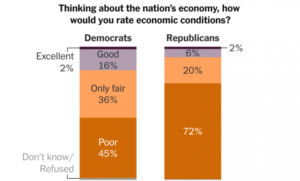Voters See a Bad Economy, Even if They’re Doing OK. Americans are feeling slightly better about the economy, but painfully high inflation is still keeping purchaser opinion at near an all-time low, according to preliminary review data released by the University of Michigan on Friday.

The preliminary file for the college’s Surveys of Consumers rose to 51.1 in July from the record low of 50 posted in June.
“The share of purchasers blaming inflation for dissolving their expectations for everyday comforts proceeded with its ascent to 49%, matching the all-time high reached during the Great Recession,” said Joanne Hsu lower on Ukraine prospects, Surveys of Consumers chief, in a statement. “These negative perspectives persevered in the face of the new moderation in gas costs at the siphon.”
The overview also showed that expectations for long haul inflation keep on getting to the next level. Median expectations for inflation levels five years from now dropped to 2.8%, which lands underneath the range of 2.9% to 3.1% seen during the past 11 months.
The shopper feeling data follows the release of new retail sales figures, which showed a slight pullback in spending as Americans battle excessive costs on everything from treats to dress. Market analysts and policymakers are intently watching for any substantial dunk in US shopper spending, which drives almost 66% of the economy.
Retail sales developed 1% in June from May to $680.6 billion and were up 8.4% from June 2021, according to data released earlier Friday by the US Census Bureau.
In any case, since retail sales figures are not adjusted for inflation, the larger number probably reflects greater costs rather than seriously spending. Inflation, as measured by the Consumer Price Index, flooded by 1.3% last month and is up 9.1% from last June.

The absolute greatest year-over-year sales gains were at gas stations, which were up 49.1%; miscellaneous store retailers, up 15.1%; and food administration and drinking places, which were up 13.4%. Sales at gadgets and appliance stores were down 9.1%, mirroring the continuous pattern of purchasers shunning expensive things for administration related spending.
Friday’s data will be firmly examined by the Federal Reserve, which is in the pains of attempting to get control over the most elevated inflation in 40 years without tipping the economy into downturn.
While certain analysts and financial specialists recently anticipated that the Fed should raise its benchmark loaning rate by another 75 basis focuses when it meets at the month’s end to examine monetary strategy, a new slew of strong financial data has markets preparing for additional aggressive action from the Fed – – including a potential rate climb of 100 basis focuses – – to cool purchaser demand.
Taken care of Governor Christopher Waller, during a discourse Thursday at the Rocky Mountain Economic Summit, indicated he upholds another 75-basis-point climb. Be that as it may, he said he would consider going significantly higher assuming that retail sales and lodging data came in more sultry than anticipated.
June’s retail activity may simply be adequately hot to help that supersized climb, said Ted Rossman, senior industry analyst at Bankrate.
“The fact that retail sales are pretty much treading water at when inflation is high, and individuals are spending a greater amount of their discretionary dollars on travel and eating out, I believe there’s a potential read on this that encourages the Fed to pull out all the stops,” he said.
